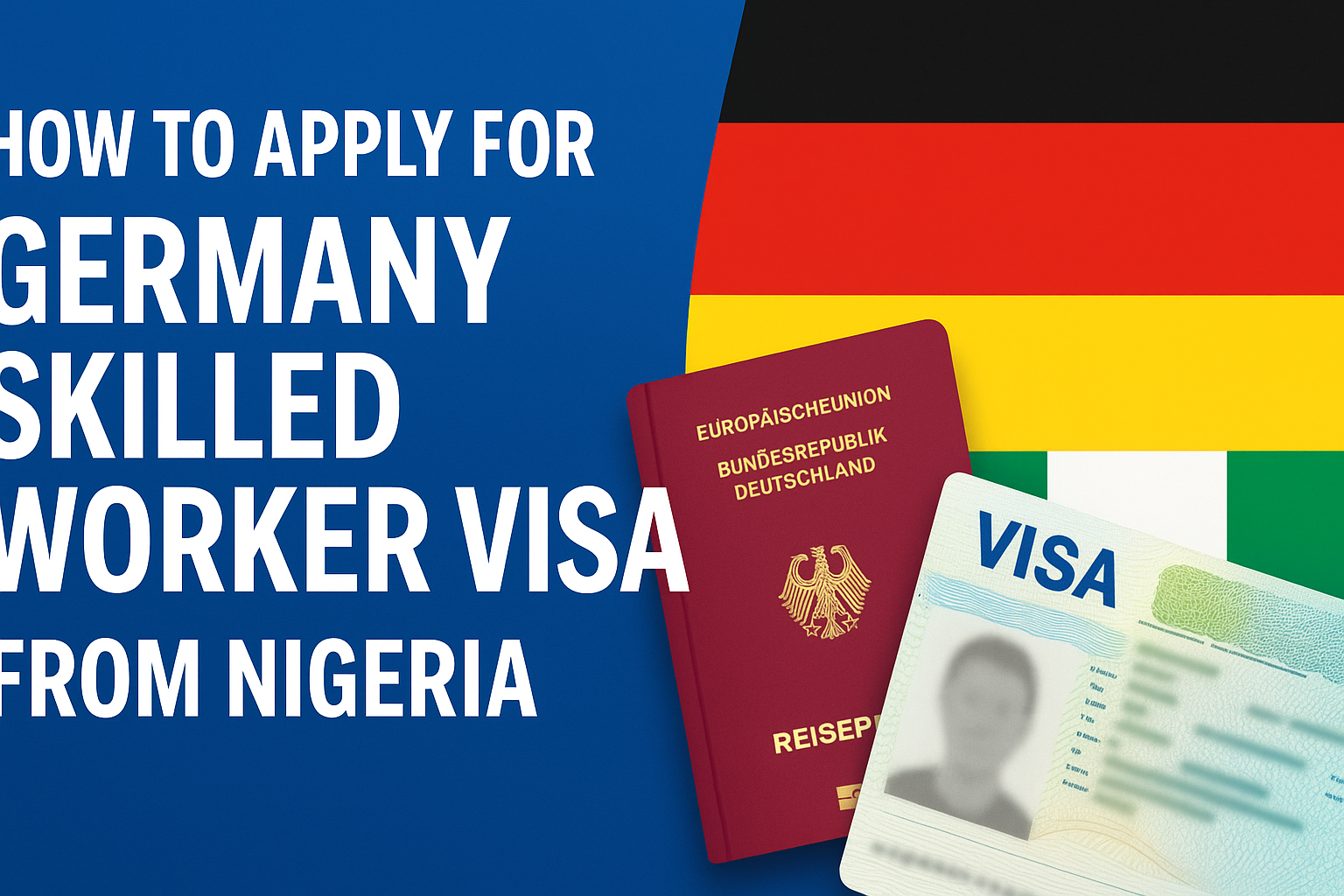Germany is one of the easiest European countries where you can legally move, work, and earn a good income even without a university degree. If you have basic education, physical strength, and are willing to work hard, Germany immigration for low skill workers is a smart path to start a new life.
Thousands of low-skilled foreign workers are already working in Germany under different visa options — including jobs in factories, cleaning, caregiving, agriculture, delivery, warehouse operations, kitchen support, and construction. The country has a serious labor shortage and is now welcoming more international workers than ever before.
What Does “Low Skill” Mean in Germany?
In Germany, low skill work refers to jobs that do not require a university degree or professional license. These jobs mostly need:
- Physical effort
- Basic training or on-the-job learning
- Simple communication skills
- No advanced technology experience
Examples of low skill jobs include:
- Cleaners
- Kitchen assistants
- Delivery helpers
- Egg packagers
- Warehouse staff
- Supermarket stockers
- Nursing aides (Pflegehilfskräfte)
- Agricultural laborers (fruit pickers, seasonal workers)
- Construction assistants
You don’t need to go to university to qualify for these jobs, but most employers expect basic German language knowledge and willingness to work full-time.
Visa Options for Low Skill Workers in Germany
There are three main pathways low-skilled foreign workers can use to migrate legally to Germany.
1. Skilled Immigration Act (2020 – updated in 2023)
This law now allows people with basic training or experience to enter Germany for work — especially in sectors with shortages.
You don’t need a university degree. What matters is relevant experience or vocational training, even from your home country. Germany now accepts more trades and labor jobs under this rule.
2. Work Visa with Employer Sponsorship (Job Offer First)
You apply for a job while still in your home country. If the employer is ready to hire you, they can provide a job contract and a formal invitation letter to support your visa application.
You’ll then apply for a Germany national work visa at the German embassy.
3. Seasonal Work Visa (Temporary Stay)
This option is ideal for those who want to enter Germany for 3–6 months to do farm or seasonal labor.
- Common in agriculture (asparagus, fruits, vegetables)
- Accommodation is often provided
- Work permit processed by employer in advance
Required Documents to Apply for a Low Skill Germany Work Visa
To apply for your visa, you must have the following:
| Document | Details |
|---|---|
| Valid International Passport | Must be valid for at least 6 months from application date |
| Job Offer Letter | Signed contract or invitation from German employer |
| Proof of Accommodation | Employer may provide address or hotel reservation |
| Health Insurance | Must cover you for the length of your stay |
| Basic German Language Certificate | Minimum A2 or B1 level recommended |
| Proof of Work Experience or Training | For relevant field (can be local training or informal work experience) |
| Visa Application Form (Filled) | Form can be downloaded from the embassy’s site |
| Visa Fee Payment Receipt | Usually around €75 for national work visa |
All documents should be translated into German or English if originally written in another language.
How Much Can You Earn as a Low Skill Worker in Germany?
Germany pays decent wages, even for low-skilled labor. The national minimum wage in 2025 is around €12.41 per hour. If you work 8 hours a day, 5–6 days a week, you can earn:
-
€2,200 to €2,800 monthly
-
More if you do overtime, night shifts, or seasonal bonuses
Some jobs also include free accommodation, meals, or transport, which saves you money.
| Job Type | Average Monthly Pay | Overtime Available | Visa Option |
|---|---|---|---|
| Warehouse Worker | €2,500 | Yes | Skilled Immigration Act |
| Egg Packaging Staff | €2,200 | Yes | Employer-Sponsored Visa |
| Nursing Assistant | €2,400 | Yes | Pflegehilfskraft Visa Path |
| Farm Laborer (Seasonal) | €2,100 | Yes (limited) | Seasonal Work Permit |
| Construction Helper | €2,700 | Yes | General Work Visa |
How to Find Visa Sponsorship Jobs for Low Skilled Workers in Germany
Many people struggle to find real job offers from German companies. The truth is, most low skill jobs are filled through job portals, agency networks, or employer referrals. But the good news is, Germany allows employers to sponsor foreign workers under its Skilled Immigration Act and seasonal labor scheme.
Where to Search for Low Skill Jobs in Germany (With or Without a Degree):
1. Make-it-in-Germany.com
This is the official government portal for foreign jobseekers. It lists real vacancies — including for cleaners, caregivers, warehouse staff, and packagers.
2. Jobbörse der Bundesagentur für Arbeit
Germany’s official job agency site. Filter listings by “no degree” or “basic vocational training.”
3. Jooble Germany
A simple site for low barrier jobs in cities and villages across Germany.
4. EURES Portal
EU-backed job site listing positions open to non-EU workers too.
5. Recruitment Agencies in Germany
Some companies work directly with agencies to hire foreign staff for:
- Supermarket stocking
- Farm packaging
- Hotel cleaning
- Kitchen assistance
- Aged care support
Examples include: Tempton, Randstad, DEKRA Arbeit, and Piening Personal.
Best Cities in Germany for Low Skill Work Opportunities
While jobs are available across the country, some regions are known for higher demand, better pay, or large foreign worker populations.
| City/Region | Industry Focused On | Why It’s Good for Low Skill Workers |
|---|---|---|
| Berlin | Cleaning, delivery, restaurants | Many startups, diverse population |
| Hamburg | Logistics, port jobs | Big shipping hub, hiring warehouse hands |
| Bavaria | Agriculture, factories | Offers seasonal work with housing |
| North Rhine-Westphalia | Retail, aged care, food prep | Industrial heartland of Germany |
| Hesse (Frankfurt) | Airports, hotels | High need for cleaners and porters |
If you speak a little German and are open to shift work or relocation, your chances are even higher.
Step-by-Step Guide: Apply for Germany Work Visa as a Low Skill Worker
Getting the visa involves 3 clear stages:
Step 1: Get a Job Offer
You can’t apply for a work visa without a signed offer. So first, use job sites or agencies to land a role.
Your employer must be able to:
- Show proof that local workers weren’t available
- Provide salary and job details
- Register the position with German labor office (if required)
Step 2: Gather All Required Documents
Refer to the earlier table. Documents must be submitted in English or German and properly signed.
Step 3: Submit Your Visa Application
Book an appointment at the German Embassy or Consulate in your country. Submit your documents and pay the visa fee.
Processing Time:
Usually 6–12 weeks depending on country and completeness of application.
Can You Move Without a Job Offer?
Yes, but only under one condition:
You must apply for a Job Seeker Visa. This visa allows you to enter Germany and search for a job on the ground for 6 months.
To qualify:
- You must show proof of funds (€947/month or €5,700 total)
- You must have basic training or skill certificate
- Health insurance
- Minimum A2–B1 level German
Common Challenges and How to Overcome Them
1. No German Language
Basic German is often needed for jobs and daily life. Aim for at least A2 level, even if it’s just conversation level.
2. Fake Job Offers
Be careful of agents asking for large upfront fees. Use only verified websites or company portals.
3. High Visa Rejection Rate
Most rejections come from lack of proper documents. Always prepare ahead — especially job contract, proof of experience, and accommodation.
Frequently Asked Questions (FAQs)
Can I bring my family if I migrate as a low skill worker?
In most cases, yes. After 6 months to 1 year of legal work, you can apply for family reunification visas — depending on your income and accommodation.
Is Germany safe for low-income immigrants?
Yes. Germany has strong worker protection laws. Employers must pay you fairly and treat you respectfully, regardless of your background.
Do I need a job offer before applying?
Yes, for most visa types. The only exception is the Job Seeker Visa, which lets you enter first and search later.
Can I change jobs later?
Yes. Once you’re in Germany and have a valid residence permit, you can apply to change employers within legal guidelines.
Summary
Germany immigration for low skill workers is not a dream — it’s already happening for many people. You don’t need to be a doctor or engineer to earn in euros. With the right job offer, correct documents, and a bit of patience, you can move legally and start working within a few months.
Just follow the official process. Avoid agents who promise shortcuts. Germany needs workers, and the law supports those who apply the right way.



